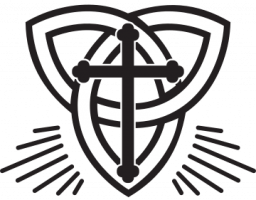Trinity Lutheran School has been educating children in Hoyleton for over 150 years. The school has Pre-School through 8th grade. All subjects are taught including math, language arts, social studies, and religious instruction. Numerous activities are also offered for students like athletics, scholar bowl, band, choir, and various after-school clubs.
Mission Statement
Compelled by the grace of God, Trinity Lutheran Church and School forgives, teaches, and serves in the name of Jesus.
Philosophy of Education
When Trinity congregation was founded in 1867, one of the first things the congregation did was to establish Trinity Lutheran School.
We believe that Christian education is an important part of God’s mission to the Church. Christ commands us in Matthew 28:19-20: “Therefore go and make disciples of all nations, baptizing them in the name of the Father and of the Son and of the Holy Spirit, and teaching them to obey everything I have commanded you. And surely I am with you always to the end of the age.”
We believe that there must be a partnership between the parents, the church, and the school to bring up a child in a Godly fashion. The parents are God’s representatives to their children on earth and the family is the greatest influence on a child’s education. As it is stated in Eph. 6:4, “Fathers, do not exasperate your children: instead, bring them up in training and instruction of the Lord.” The church and the Lutheran School must assist the parents in bringing up the child. Parents, school, and the church must work together to develop a child to his/her fullest potential.
A school without Christ can only train the body and the mind. We believe that a Christian education is dedicated to providing a complete education by meeting the spiritual, intellectual, physical, emotional, and social needs of the child. It is the primary purpose of Trinity to guide the thoughts and actions of the students in a way that their characteristics, actions, thoughts, and attitudes will reflect Christ-centered behavior here on earth and prepare them for eternal life in heaven.
The spiritual development of the child brings the child to a better understanding of God and His Word. The child will grow in faith in Jesus as his or her Savior and come to the recognition that he or she is a sinner and that God has forgiven him or her of their sins. The spiritual development of the child should create in the child a desire for self-discipline, to serve God and his fellow man, to carry on a rich devotional life, and to continue to study His Word. Finally, the spiritual development will lead the child to recognize that all earthly and spiritual blessings come from the Lord.
The intellectual development of the child will give the child a good knowledge of the skills in all basic branches of learning. The child will develop an investigative mind, learn to think independently, learn helpful study and work habits, and discover leisure time interests. The child will use God’s Word to evaluate all human knowledge.
The physical development of the child’s muscles and coordination must be assisted and developed by the school. The child will be assisted in developing and keeping desirable physical habits. The child will regard his or her body as a temple of the Holy Spirit and learn to use his or her body for the work that God has given to him or her.
The emotional development of the child will be met by providing the child love, security, and feelings of acceptance and self-worth. The child will be able to practice self-control. The child will realize that he or she is the crown of God’s creation, Christ died for him or her, and God has forgiven his or her sins. The child will develop a sense of what is beautiful in the world that God has created around him or her. The social development of the child will bring the child to lead a Godly life. The child will recognize that he or she is living in a world filled with other humans. The child will learn to recognize the rights of others. The child will respect, under God, the authority of the home, school, and government. The child will realize his or her civic responsibilities to his or her fellow man.
We believe that Christians “are not of the world as I am not of this world…” (John 17:14). However, Trinity has the responsibility to teach its students the cultural history of the past, to train students in the ideals of democracy, to develop in its students the ability to think clearly, and to give its students the realization that they must be open to learning new things. In conjunction with parents, we use the resources of the school and the church community, including the most up-to-date technology, materials, and techniques.
